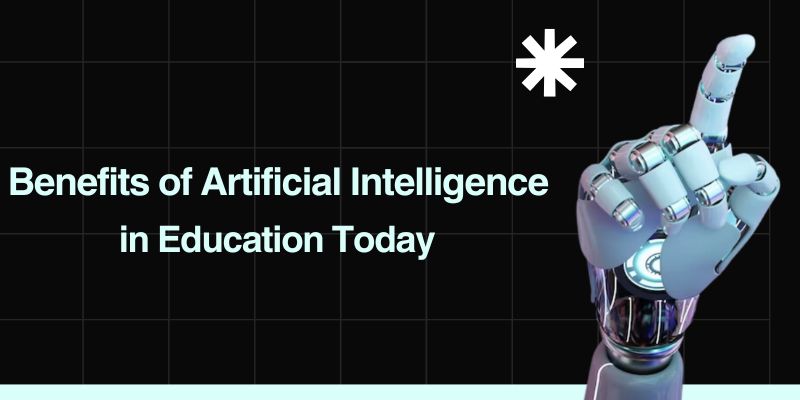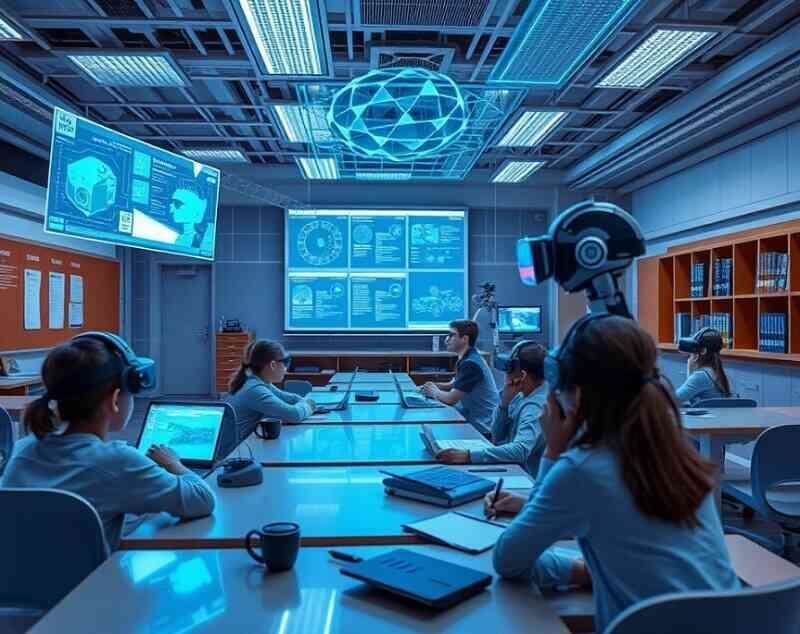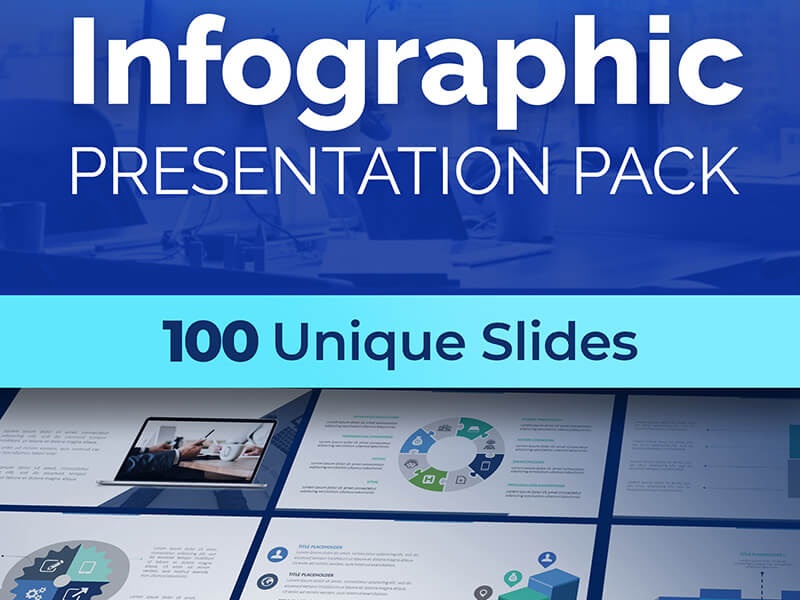
Today, artificial intelligence is making a difference in our fast-changing education world. The benefits of artificial intelligence in education are that it teaches us different ways of teaching, learning, and managing schools. This shift is exciting for everyone involved in education.
AI offers new opportunities to improve learning. It helps students get lessons that fit their needs and helps teachers work more efficiently. These changes are making education more effective and enjoyable for everyone.

A futuristic classroom with diverse students engaged with interactive AI technology, holographic displays showcasing educational content, robots assisting learning, vibrant colors, and a modern design emphasizing collaboration and innovation.
The main takeaways
- Personalized learning, adaptive content distribution, and information-driven decisions are examples of AI-driven technologies revolutionizing educational experiences.
- Automated grading, lesson plan help, and performance insights are just some ways artificial intelligence (AI) makes teachers more productive.
- Temporary AI-powered administrative solutions make institutional operations easier, helping decision-making and allocating resources more optimally.
- AI in education integration results in better learning outcomes, more student involvement, and more effective teaching.
- Just like AI has evolved, education will be much more personalized, data-driven, and technologically advanced.
Understanding AI’s Role in Modern Education Systems
Artificial Intelligence (AI) is rewiring education, making it more personal and efficient. Understanding how AI works in schools and how it’s changing classrooms is essential.
Basic Components of Educational AI
AI in education brings together data analytics, natural language processing, and learning algorithms. These tools help analyze student work, give feedback, and perform tasks for teachers, improving learning for everyone.
How AI Technologies Transform Learning Environments
- Adaptive Learning Platforms: AI adjusts the learning content and pace for each student, ensuring that everyone receives the proper support and assistance.
- Intelligent Tutoring Systems: AI tutoring systems give feedback, answer questions, and guide students. Students benefit from this and maintain their interest in what they are learning.
- Virtual Assistants: AI virtual assistants help with tasks, remind students of schedules, and answer simple questions, freeing up time for further in-depth learning.
Current Implementation Stages in Schools
AI is increasingly being used in academic institutions. It helps with tasks and makes learning more personal. As AI improves, it will change how we teach and learn even more.
| AI Technology | Current Implementation Stages |
| Adaptive Learning Platforms | Extensive use in academic institutions, emphasizes the customization of the educational process. |
| Intelligent Tutoring Systems | Early uptake, as more educational institutions investigate how these AI-powered tools could improve student performance and engagement. |
| Virtual Assistants | Increasing integration in educational institutions, assisting with administrative tasks, and providing support to both students and teachers. |
Teachers and leaders must collaborate as AI develops in higher education. They must ensure AI meets students’ needs and protects their privacy. By using AI to improve student learning, education can offer more personalized and fun learning experiences.

An advanced AI technology integrated education; students used virtual reality headsets to access the holographic display of educational content and help robot tutors grow personalized learning, bright and modern aesthetics focused on Collaboration and Innovation.
Benefits of Artificial Intelligence in Education
Artificial Intelligence (AI) has changed education a lot. It has brought many benefits that have made learning better. As AI becomes more common in schools, its good points are clear. It’s shaping the future of learning in significant ways.
Personalized learning is a significant benefit of AI in education. AI can modify lessons to meet the needs of every learner, improving student performance and making studying more enjoyable.
AI also makes education more efficient. For example, it can grade papers fast, allowing teachers to spend more time on essential tasks. AI also helps plan lessons and track student performance.
The impact of AI on education goes beyond the classroom. It can help with things like signing up for classes and managing resources. This makes schools run better and helps make data-based decisions.
The future of learning looks bright with AI. It lets teachers create better, more tailored learning spaces. Students can realize their full potential as a result.
AI in education is not about replacing teachers but empowering them to do what they do best: It will inspire and lead students on their learning path.
| Advantages of AI in Education | Impact on the Future of Education |
| Personalized learning experiences Increased efficiency in educational processes Automated grading and administrative tasks Improved data-driven decision-making | Enhanced student engagement and learning outcomes Optimized teaching strategies and resource allocation Streamlined institutional operations and data management Continued evolution of AI-powered educational tools and platforms |
Personalized Learning Experiences Through AI
Artificial intelligence (AI) is changing education. It uses adaptive learning platforms to give personalized learning experiences. Such opportunities meet each student’s specific requirements.
Adaptive Learning Platforms
AI-powered platforms analyze how students learn and progress. They adjust the content and difficulty to fit each student’s needs, resulting in students learning more effectively and developing more quickly.
Custom-Tailored Content Delivery
AI in higher education also creates personalized content. It uses machine learning to find the best learning method for each student, making learning more effective and exciting.
Student Progress Tracking and Analysis
AI helps track and analyze student progress. AI-powered tools monitor students’ performance and identify their strengths and weaknesses. This allows teachers and students to improve learning.
AI makes education more personal. It supports students’ academic success and helps them realize their full potential.
AI-Powered Administrative Solutions for Educational Institutions
AI is changing education in significant ways. It’s making a big difference in how schools and universities work. AI helps them work better, use resources wisely, and accomplish more.
AI brings many benefits to schools. It automates tasks, manages resources, and helps make better decisions. These tools save time, reduce work, and offer insights for leaders.
Streamlining Student Admissions and Enrollment
AI makes applying to college easier. Chatbots help students with their applications. AI also picks the best applicants, making admissions smoother.
Optimizing Resource Allocation
AI helps schools use resources effectively. It analyzes data to plan classes, staff, and facilities, saving money and improving the student experience.
Enhancing Data-Driven Decision-Making
Schools have a lot of data. AI tools make sense of it, helping leaders make better school choices.
More schools are using AI to improve their work. It helps them manage well and focus on teaching. AI is critical to improving education.
Enhancing Teacher Productivity with AI Tools
Teachers face new challenges in today’s education world. AI tools are now helping them work more efficiently. These tools handle tedious tasks, letting teachers focus on what matters most: assisting students to grow.
Automated Grading Systems
Grading assignments is a big challenge for teachers. AI grading systems have changed this. They use intelligent algorithms to check student work quickly and accurately.
This speeds up grading and helps teachers see where students need extra help. It also allows them to tailor their teaching to each student’s needs.
Lesson Planning Assistance
Creating lesson plans might take a long time. AI tools help by using massive databases to find the best plans. They recommend multimedia and exercises to make lessons enjoyable.
This saves teachers a lot of time and improves their lessons. It helps them focus on teaching, not planning.
Performance Analytics and Insights
Understanding how students are doing is vital for teachers. But it can be hard work. AI analytics give teachers deep insights into student learning.
It tells you how students are doing so you know what they need and how to improve. This enables them to make better decisions about what to do and what to do with their students.
AI in education is growing but brings challenges like privacy and training needs. Yet, AI tools are making teaching better and helping students succeed. They promise to improve education, assisting teachers to give their best.
Conclusion
Finally, artificial intelligence’s benefits in education are expected to transform the world of learning and provide a personalized learning experience, efficient administrative processes, and endless accessibility. Using AI, educators can personalize their instruction to serve different students’ needs, speed up workflows, and create a culture of acceptance.
However, educational institutions should not overlook these advancements as we move forward. They need to be at the forefront of these advancements to enable vehicles for educators and learners to harness the power of AI fully. As this technology is embraced, it gives students opportunities not only for the future but also to build a more engaging and effective educational journey. It’s time to act; let’s commit to changing education using the power of AI.
FAQ
How can AI improve student learning?
AI can help students learn in many ways. It offers personalized learning experiences and interactive tools. It also provides timely feedback and insights to improve learning outcomes.
Because AI handles some tasks, teachers can focus more on students, and learning becomes more effective and efficient as a result.
What are the benefits of utilizing AI in the classroom?
Using AI in teaching has advantages. It offers a personalized learning experience and enhances student achievement. Additionally, it maintains students’ motivation and engagement.
AI helps teachers by freeing up time for more critical tasks. It offers insights to improve teaching strategies, making education better for everyone.
What role does AI play in higher education?
AI is significantly impacting higher education. It offers adaptive learning platforms and virtual tutoring, and it also helps with grading and feedback.
AI predicts student success and helps manage campuses. These resources improve the effectiveness and efficiency of education.
What difficulties does implementing AI in education present?
On the anvil of AI, though, it has advantages and disadvantages. It must make sure that AI is used with ethics. It must safeguard student information and privacy.
Bias-free AI is necessary to guarantee equitable learning. Educators need training to use AI tools well. AI in education should be available to anyone.
There are also worries about AI replacing teachers. However, AI can improve the work that instructors do.
How will artificial intelligence affect schooling in the future?
In the future, schooling will be transformed by AI. This will personalize and engage learning in a way that can’t be achieved by us trying to re-purpose already existing tools. Teachers will be more productive and focused on essential tasks.
AI will help make education more efficient and effective. It will also make quality education more accessible, especially for people of color.
Artificial intelligence will aid students in preparing for a fast-changing job market. It will provide abilities in critical thinking and problem-solving.
Also, read our related articles:-





